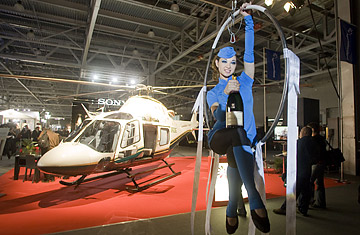
The opening of a luxury Millionaire Fair in Moscow has shown that even the global financial turmoil cannot keep Russia's super-rich from spending
A man in a metallic-sheen suit strolls slowly down an aisle with a dark-haired woman in fur on his arm. They stop occasionally to examine one of the many Persian carpets arrayed on a wall the length of a tennis court. Against the black cloth of the exhibition hall's walls, the brightly colored handmade silk carpets — in vibrant blues and greens, luscious reds and purples — almost leap off the backdrop.
Russian businessman Alexander Kazakov, who makes his money selling luxury home furnishings, and his wife have come to the annual Moscow Millionaire Fair looking for a carpet for the front hall of their newly remodeled apartment in the center of the city. But they're having trouble deciding on colors and how many knots they want per square inch. Then there's the matter of whether they can actually afford to spend $155,000 on a carpet at the moment. "No one knows what will happen next with the financial crisis," Kazakov says. "Everyone is waiting to see." His wife adds, as she continues to walk down the length of the display, "But when you want something ..." (See pictures of Russian aristocracy.)
These days Russia's wealthy can't always get what they want. The country's once soaring economy is in free fall — growth, which has averaged 7% over the past five years, could drop below 2% in 2009, according to economists — and it's taking the rich down with it. Not that long ago, Russia was the poster child for unfettered wealth and freewheeling consumption. Now, with the stock market down more than 70% in the past year and the ruble feeling the strain, the nation's high earners are a little less quick to put their hands in their pockets.
At the Millionaire Fair late last month, even the glare off the hood of a $250,000 Wiesmann MF4 supercar could not blind a visitor to the fact that there was far less interest on both sides of the cash register. A glitzy show designed to part Russia's well-to-do from their cash, the fair is usually spread out through three halls in Moscow's Crocus Expo center — this year it took up only two. With fewer vendors and wider aisles between the stands, the small number of visitors seemed even more sparse. "There are much fewer people this year," said Dzhasur Madzhidov, a carpet salesman with Persian World, a Tokyo-based seller. Normally, "we would have sold everything — even the carpets off the walls." (See pictures of Moscow.)
Founded in Amsterdam in 2002 by Dutch entrepreneur Yves Gijrath, the Millionaire Fair holds shows around the world. But thanks to booming oil prices and Russia's nouveaux riches, the Moscow event had become the jewel in the crown. No wonder. According to the 2008 World Wealth Report by Merrill Lynch and Capgemini, Russia is home to one of the world's fastest-growing populations of millionaires. Last year the number of Russian "high net-worth individuals" (people with a worth of more than $1 million, excluding their primary residence) reached 136,000, a 14% rise over 2006.
There are no figures yet on what impact the financial crisis has had on that top-tier trend. But after so many years of heady growth, many rich Russians still seem to take the boom times for granted. Kazakov's wife's bravado is shared by many. "Some people are afraid, but I am not," says businessman Alexander (who asked that only his first name be used), as he strolls along the deck of a 58-ft. yacht wearing a shiny leather coat with a fur collar.
But a few of the wealthy visitors at the fair have noticed a change this year. "Last year the show was more powerful," says Joseph Morchic, a Russian businessman based in New Jersey. "Everyone here thinks there will be a crisis, but they don't know what it is yet. My friends talk about being afraid, but I don't think they are." Morchic points out that Russia has been through worse before — and bounced back. "You can't compare this crisis to the one in 1998," he says, referring to the year the ruble collapsed and Russia defaulted on tens of billions of dollars' worth of debt.
Under the golden dome that tops the booth for Maître-Verrier, a French designer of high-end stained glass, saleswoman Claude Bonte captures the sense of optimism changing to gloom. "Russians are always good clients," she says, "for the moment."
